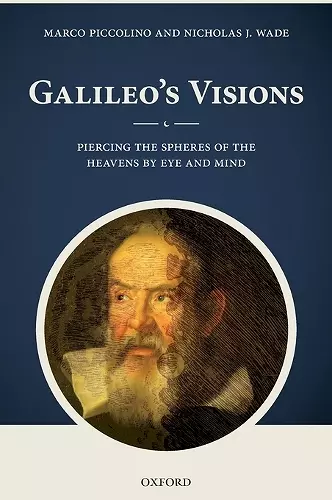Galileo's Visions
Piercing the spheres of the heavens by eye and mind
Nicholas J Wade author Marco Piccolino author
Format:Hardback
Publisher:Oxford University Press
Published:5th Dec '13
Currently unavailable, and unfortunately no date known when it will be back

Galileo is known as a pioneer of science - especially of mechanics and astronomy - but far less attention has been paid to his work on the senses generally, and more specifically on vision. In this book, two experts on the history of science look at the novel ways in which Galileo looked at the heavens through his telescope, and, in the process, emphasised the importance of contrast phenomena and visual resolution for all observations. He also described the senses and perception in terms that found an echo in doctrines advanced by nineteenth century sensory physiologists. In a fascinating and accessible style, Marco Piccolino and Nick Wade analyse the scientific and philosophical work of Galileo Galilei from the particular viewpoint of his approach to the senses (and especially vision) as a means of acquiring trustworthy knowledge about the constitution of the world. For Galileo evidence from the senses was potentially ambiguous, hence reliable information capable of penetrating the complexity of reality could only be obtained by interpreting the sensory data critically. The philosophical background of Galileo's attitude to the senses was his awareness that nature had not developed a specific language aimed at communicating with senses generally and human senses in particular. Galileo's analysis of the senses corresponded closely to a fundamental tenet of modern sensory physiology and psychophysics - the absence in the world of specific sensory signals like sounds, colours, tastes, and odours. Fully illustrated throughout, this book is an important contribution to psychology and the vision sciences, but more broadly to our knowledge of a pioneering figure in the history of science.
In this book one discovers the very remarkable work of Galileo who succeeded in placing an understanding of visual function within a modern perspective. His discoveries revised the physiological and psychological outlook of his time. In this regard, it suffices to consider the perception of the moon. Before Galileo this celestial body was seen as a flat disc, illuminated by the sun alone and embedded in the vault of the heavens. After his discoveries the moon became a mountainous sphere revolving around the earth and also illuminated by it This masterly work should be bedtime reading for every humanist worthy of this name. * Michel Meulders, Professor Emeritus, University of Leuven, Belgium and former President of the Royal Academy of Medicine, Belgium *
ISBN: 9780199554355
Dimensions: 253mm x 181mm x 25mm
Weight: 842g
338 pages